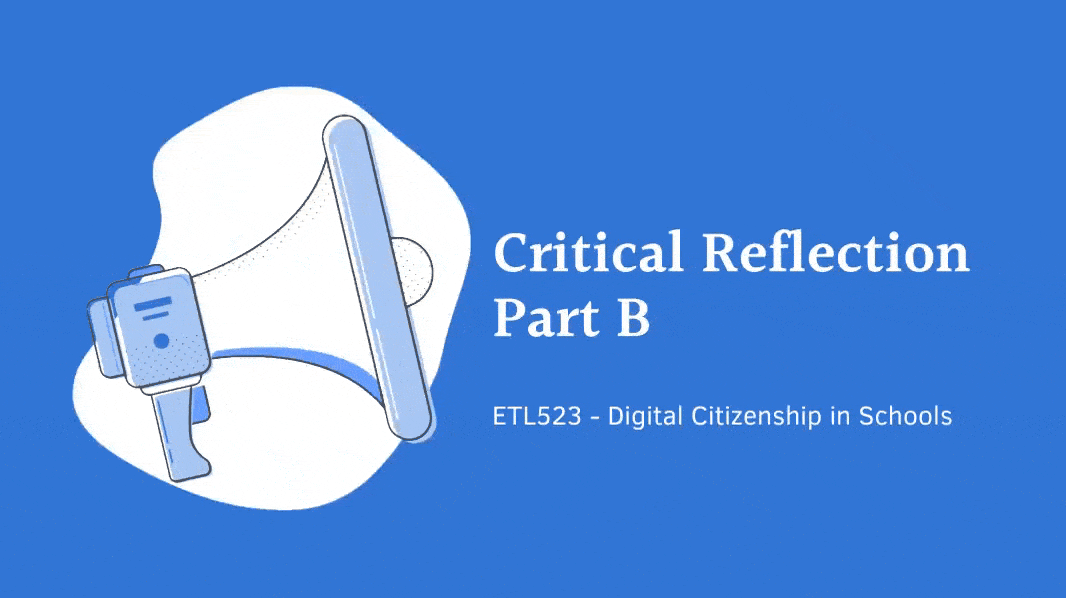
The concept of Digital Citizenship is one I have interest in. I was intrigued what it meant to be a “Digital Citizen” and most importantly how do you become one? A digital citizen is defined as using appropriate and responsible behaviour in relation to technology within an online environment and presents many challenges not evident offline (Bearden, 2016, p. 2). A digital citizen has a moral and ethical responsibility to act responsibly regarding technology to promote inclusivity and equity for all participants of a digital community.
When engaging as a digital citizen within a professional context, it is important to curate a strong digital identity. Digital identity extends beyond a profile image and includes online interactions, comments, posts and communication should be of a high standard and portray the image and identity that shapes your professional identity. It is largely known, recruitment agencies conduct Google searches on candidates as part of a digital refencing process (Linder, 2018, p. 32). What you do online today will impact tomorrow, therefore, it is imperative the digital footprint you leave behind is positive, informative and demonstrates a responsible digital citizen.
In preparing the environmental scan for a school environment in subject ETL523 the emphasis of the report was a focus on creating a Digital Learning Environments (DLE) to deliver online learning. Due to COVID-19 my current teaching environment swiftly moved from face-to-face delivery to online learning. As a result, I was interested in exploring the viability of continuing online delivery post-COVID-19 and reviewing new opportunities available for teaching and learning within a digital environment.
The environmental scan highlighted the challenges of institutional culture as a major barrier to the adoption of digital literacy and the introduction of technology into the learning environment. Many educators will resist change if they do not see a need or value in the adoption of new initiatives or technology and as a result, hold onto outdated and didactic teaching practices (Reynolds, 2017, p. 46). As a strategy to shift traditional cultural values the environmental scan recommended the establishment of a Community of Practice (COP) to provide a support network for collaboration and sharing of ideas in the creation of new knowledge networks.
A COP within a digital context is likely to be established through social media platforms, for example, Facebook, Instagram and Twitter to build online networks to promote innovative thinking, sharing and curating of content and development of digital citizenship participatory skills (Yarris et al., 2019, p. 2). In the development of the environmental scan to achieve educational objectives the recommendation is to establish a COP, titled “Digital Leadership Team”. This will provide academic support to aid the transition from face-to-face delivery to online. The structure of the COP requires a framework of academic leadership supported by the college infrastructure of Library Services, E-Learning and Information Technology departments. It is imperative a wide network of expertise work together to provide knowledge and technical support as students and staff navigated a new world of online learning and delivery. Strong support networks are likely to improve user experience and a willingness to implement new strategies.
Social Constructivist theorist, Vygotsky holds the view learning is a social practice and through actively engaging in peer learning and social activities a higher level of critical thinking is achieved with new perspectives and opinions that may not have been previously conceived (Pillay, 2019, p. 29). The act of social learning is achievable through the adoption of a COP to promote positive digital citizenship that now extends beyond a local network of colleagues to reach a global network to create world innovators and global digital citizens.
In summary, actively engaging in unit ETL523 I now have a higher level of understanding on the social and ethical issues surrounding digital citizenship. Through active participation in discussion forums, Twitter posts and Facebook this has now become my “new normal” as a form of communication and lifelong learning for continual growth as I navigate a changing world.
Bearden, S. (2016). Digital Citizenship: A Community-Based Approach. Corwin.
Linder, K. E. (2018). Managing your professional identity online : A guide for faculty, staff, and administrators. Retrieved from https://ebookcentral.proquest.com
Pillay, P. (2019). Teaching and learning theories in higher education and its impacts on Africa’s development: A personal reflection. Journal of Gender, Information and Development in Africa (JGIDA), 8, 27-27–43. Retrieved from https://ezproxy.csu.edu.au/login?url=https://search-proquest-com.ezproxy.csu.edu.au/docview/2328296149?accountid=10344
Reynolds, M. (2017). A digital divide from faculty’s perspective: The millennial BSN student meets the baby boomer nursing faculty (Order No. 10635819). Available from ProQuest Dissertations & Theses Global. https://search-proquest-com.ezproxy.csu.edu.au/docview/1986249827?accountid=10344
Yarris, L, M,. Chan, T, M., Gottlieb, M, Juve, A, M,. (2019). Finding your people in a digital age. Virtual Communities of Practice to Promote Education Scholarship. Journal of medical education. Vol.11(1), pp.1-5. https://doi.org/10.4300/JGME-D-18-01093.1

